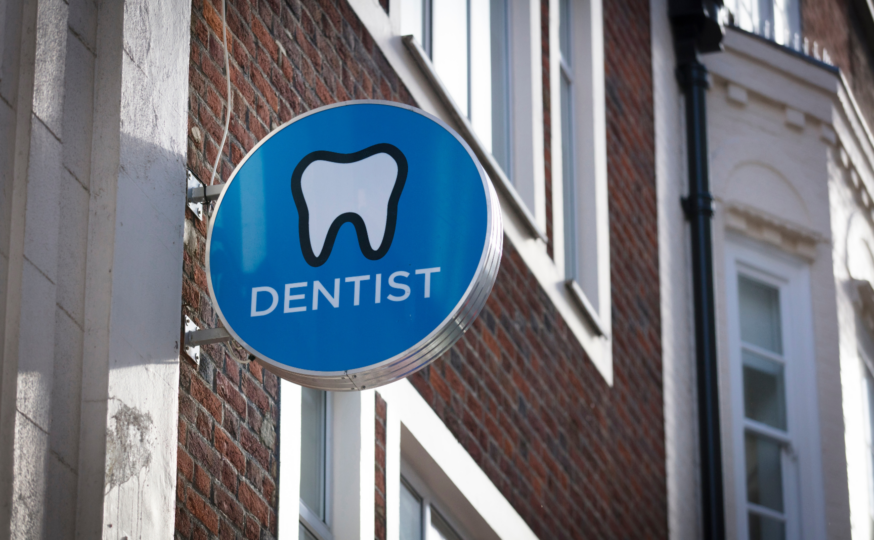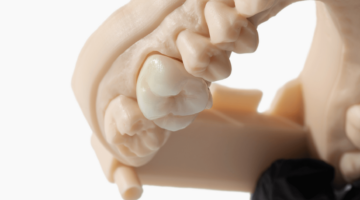Maybe you’ve just graduated from school and are hitting the market for the first time, maybe you’re moving to a new city and pressing the reset button, maybe you’ve split with a partner and have decided to go solo. Whatever your motivation for starting a new practice, opportunity and possibility lie ahead. But you’re not just embarking on a journey of clinical excellence, you’re becoming a small-business owner. As such, one of the primary choices you must make is naming your dental practice. “But I don’t want to waste time thinking about a name!” you may say, “I grew up going to Eulalia Gristlebottom DDS and if naming her practice after herself was good enough for her, it’s good enough for me! ” Well, here’s the truth: failing to fully consider your business’ name is a massive misstep right out of the gate. Not only could you hurt your chances of attracting customers, you can hobble future opportunities, and may even wind up tangled in legal weeds!
Your business’s name is a fundamental part of marketing and branding–bedrock to which every business owner should pay close attention. Marketing is your overall strategy for reaching patients. Branding–the central focus of this article–is your identity, that is, how you want your patients to see you and manage their associations. “Brand identity is more than just finding the right logo to place on coffee cup sleeves or mount above your front door,” says Wayfair Senior Brand Manager, Jared Rosen. “It’s about crafting a personality that amplifies the core elements of your brand’s DNA.”
Things to consider when naming your dental practice
We at Dandy know you didn’t go to business school. That’s why we’ve assembled a series of simple, easy to understand Do’s and Don’t’s to consider when naming your new dental practice. These are based on marketing, branding, and social psychology wisdom. Some hew close to common sense, some are less obvious–all are worth consideration.
Do understand your market
One of the primary considerations when opening your practice is, not just location, but the population therein. You must ask yourself: what is the market I am aiming to serve?
If you assume that general dentistry functions about the same in all areas and with all populations, you’d be wrong. And if you believe that a generic name for your general practice is the safest play, you might be failing to capitalize on an opportunity.
But how does this kind of information help you decide on a name for your practice? Well, naming your practice “Sonrisas Felices” makes a whole lot more sense if you’re setting up shop outside of San Antonio than Bangor, Maine. If you’re appealing to a mostly-female clientele, “Hardcore Chompers Inc.” probably isn’t a smart play. If Emmetsville, USA is home to Emmetsville Grocers, Emmettsville Physicians, Emmetsville Bookstore, etc. and they like it that way, you may just have yourself a good hint.
Take a long look at the existing local business landscape, examine population and census data, go out into the community and get to know folks personally–get an idea of your clientele and their values because they will be your practice’s lifeblood. By getting the lay of the land, so to speak, you can put your business’ name to work establishing yourself as an alternative to an already dominant competitor, appealing to an underserved population, or creating a connection to local lore and history.
Do consider local signifiers
If you aren’t going to put your name on the shingle, think about using the power of landmarks, location, or community in your name. We know that patients only want to travel within a small radius from their home so a name can impress the locality. When naming your dental practice take inspiration from geo-specific “Downtown Dental,” “5th Avenue Dental Services,” and “Riverview Dentistry.”
Don’t rely on short-term trends
You’re not trying to make an initial splash, you’re trying to set down roots and go the distance. You want a name for your dental practice that stands the test of time. While catchy, buzzy phrases may initially grab attention, they often become overused, lose their appeal, and wind up feeling dated. It might have seemed like a great idea circa 1999 to use the names “Millenium Dental,” or “Dental 2000,” now… not so much.
Regardless of what the kids are TikToking these days, you should aim for a name that will feel good 10, 20, 50 years from now. By focusing on timeless qualities and avoiding trends, you’re giving your practice an opportunity to establish an enduring identity.
Do consider your strengths
Your expertise can be a powerful marketing tool. This, of course, refers to clinical specializations, but it can also extend to other aspects that may give you an edge. Customer service, cutting-edge tech, affordability–the ways you plan to differentiate yourself from competition can be a great starting place for your practice’s name.
If, for example, you’re primarily a pediatric practice, it makes sense to consider how your name makes you more appealing to kids and parents. If you’re specializing in orthodontics, signaling a confidence boost may help clients reconsider that elective procedure. If visiting your office will feel like stepping into a 5-star spa, it might serve you to broadcast the fact with words that convey calm, luxury, or tranquility. Give your patients a reason to judge a book by its title and choose you over the more generic or confusing competition.
Don’t be too narrow or specific
If you offer a wide range of services (especially now when they are easy to add with digital dentistry) to a diverse audience, but if your name is too narrowly focused, that can give the wrong impression. For example, you may be a general dental practitioner with expertise in correcting sleep disorders, but a name like “Better Sleep Dentistry” doesn’t convey your whole story.
It’s also worth considering that, later on in your career, your practice may add partners with different specializations, you may widen the demographic you’re aiming for, you could adopt new tech that enables you to offer more services–in any of these cases, a name that’s too specific can present a roadblock. You don’t want to have to explain to patients that you do more than advertised, spend money on clarifying advertisements, or undergo a costly re-brand.
Do be creative when naming your dental practice
The early stage of planning your practice is a great opportunity to toss out possibilities and take risks. You never know what will land and you have nothing to lose in finding out. Having fun at this stage is an opportunity to get an edge over “Area Dental Associates” or “Tom Smith DDS.” According to the ADA, 90% of all dental practices have a generic name. This creates a clear opportunity to set your brand apart from the competition.
Some of the most important resources are people you trust–bounce ideas off of to get their honest feedback. You should keep a running list of words and phrases you like and update it whenever something pops into your head. Plug words into a thesaurus and see what comes out. Make a vision board with words and photos that inspire you, align with your core philosophy and/or aesthetics. And try out words that just feel right. Don’t get hung up on any one idea, rather, keep a list of top contenders and narrow it down over time.
An often overlooked aspect of a practice’s name is how it sounds when spoken, so don’t be afraid to ask others to recite the top contenders aloud and pepper the name into casual sentences. This is not just a bit of folk wisdom; studies have shown that the sounds of some words alone may make them more memorable. Rhymes, alliteration, and concrete associations all also help your name stick in patients’ minds. Consider that Häagen-Dazs, Kodak, Xerox, Sony, Google, and Ikea are all invented words.
Do get too out there with spelling
A study published in the journal of consumer psychology shows that consistency between how someone believes a brand should be spelled and how it is pronounced has a positive correlation with the ability to recall said brand name.
And if you’re tempted to try using an inscrutable practice name to create some kind of viral interest, don’t. Consider a study in the Journal of Consumer Marketing showing that “brand names should be simple, distinctive, meaningful, emotional, make use of morphemes, [and] phonemes…” Which is another way of saying that overly complex names that are difficult to understand and parse wind up adding to your marketing burden. “In some cases, the URLs are taken so companies have to spell their names funny,” says Leonard Lodish, Wharton School of Business emeritus professor of marketing. Many startups believe that purposely misspelling a phoneme helps distinguish their brand, but, Lodish says, “It hurts, not helps.”
This, unlike some other tips in this list, can also go directly to supporting brand awareness through word-of-mouth. While studies have shown that even older adults tend to research new dentists online, keeping your brand name simple, recognizable, and easy to pronounce can help reach those who do not.
Apologies if your given name is not easy to pronounce, and you should be proud of your name, but when naming your practice make sure it is Googlable to someone who has never seen the name written down.
Do research
If you take nothing else from this article, remember that it’s essential for you to do due diligence when naming your new dental practice because the cost of foregoing this step is high.
One of the most fundamental considerations is your domain name–you want to make sure that people who search for you will find you. Don’t worry if you can’t secure the exact domain name dot-com, but before you add the word ‘dentists’ or ‘dentalprofessionals’ to the end of the phrase and call it a day, it’s smart to make sure the other search results don’t have any negative associations.
There are also legal reasons you need to research potential names. Failing to do a patent/trademark search in your state can make your life difficult very quickly. This is especially important if you are (and from a legal perspective, you should be) incorporating as an LLC.
It is also worth looking at Google trends for searches in your area. This can help you start to formulate a solid SEO strategy for your site. Including generic common search terms like, “Cosmetic dentists,” “dentists near me,” and “Dentists in my area” in the text on your site will help drive traffic to you, at least in theory. But don’t miss out on more specific, more local-centric keywords and phrases.
Don’t overcomplicate things
Remember, KISS: Keep it simple, stupid! As many other sections of this article have pointed out, a short and sweet name is likely your best bet for creating a memorable brand name–a finding supported by MIT research on word recall which says that “the most memorable words had a one-to-one relationship with their meanings.” What does that mean? Only that you should try, as much as possible, to create a short distance between your practice’s name and what you do. “Dental prophylaxis” is a lot harder for people to grasp than, “Tooth cleaning.”
In his research paper titled “Empirical Evidence for Domain Name Performance,” Karl Ulrich, vice dean of entrepreneurship and innovation at Wharton School of Business, identified simplicity as a key factor in successful branding, especially with reference to driving website traffic through domain names. Domain names with seven characters or fewer, excluding the suffix, Ulrich says, tend to generate higher traffic.
Do seek to create positive associations
At base, doing good business means adding meaningfully to community well-being and being seen as an indispensable source of healthcare and support. You want your community to be able to rely on you. Naming your new practice can help in this endeavor. “Emotional branding” is a term describing “consumers’ attachment of a strong, specific, usage-relevant emotion—such as bonding, companionship, or love—to the brand,” and studies have shown that fostering this connection pays dividends. While you can’t simply incept positive associations into your patients’ minds, you can use your practice’s name to help lay a foundation for such feelings by priming your potential patients. To this end, it can be a good idea to play with words or phrases associated with care, serving your community, or support, and think about how you can build your brand and marketing strategy around those ideas.
Once you get patients in the door, rendering a high standard of care consistent with your brand’s identity can create a snowball effect via advocacy marketing, that is, performing well enough that you turn satisfied customers into community supporters.
Tip: When thinking about naming your dental practice, consider that your best referrals will come from word-of-mouth, so don’t make it a mouthful.
Don’t be afraid to seek help
You may have the best practice in the world with the highest standard of care, but if you can’t actually attract customers, your business will wither on the vine–a truism at the very core of marketing as a concept. But maybe you’re not a natural-born marketer. Maybe you’re too busy to spend time brainstorming names, maybe you don’t have that creative juice, maybe you’re paralyzed by possibility.
Rather than resigning yourself, picking a ‘meh’ name and foregoing branding as a keystone in your marketing strategy, swallow your pride and get help.
Advertising, marketing, and branding professionals can make all the difference, and to some, the up-front cost is worth it in the long run. With all of the moving parts and intricacies of starting a small business, employing an outside consultant to formulate your brand identity and help you name your company can take a lot of the pressure off, freeing you up to apply your expertise elsewhere. There are even dental-specific marketing companies who know the business inside and out.
What makes a great dental practice name
If you’re launching a new dental practice–becoming a small-business owner–the significance of branding and coming up with a compelling business name can’t be overstated.
Your brand serves as the first impression patients have of your practice, shaping their expectations and perceptions, and allowing you to create connections to a community. A well-crafted brand identity not only attracts patients but can help instill trust and confidence in your care–the factors that will keep patients returning and referring their family and friends. It’s not an exaggeration to say that your business name is the cornerstone upon which your business’ identity is built; it can do so much more than help people find you. A great name can help you reach your target market, give you an edge over competition, create positive associations with your brand, and solidify your role within a community.
When naming your dental practice, it should be simple, memorable, reflective of your strengths, creative, and have evergreen resonance with your target audience. In the competitive dental industry, where patient trust and comfort are paramount, a strong brand and a resonant business name might just be the factor that propels your practice to success.
As you are starting out, consider using Dandy as your dental lab. There is a lot of overhead to launch a practice, if you work with Dandy we’ll provide a top-of-the-line intraoral scanner for free. Contact us today to learn about more benefits.



